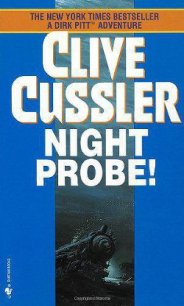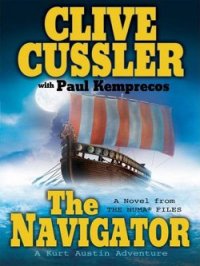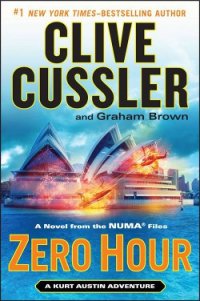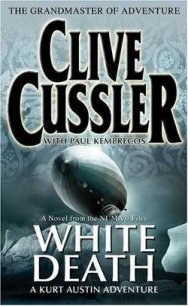Inca Gold - Cussler Clive (читаем полную версию книг бесплатно txt) 📗
"Who are you?" she asked. "Do you work for Mr. Zolar?"
He did not reply for several seconds. When he spoke, it was with an odd voice with no inflection. "My name is Tupac Amaru."
And then he turned and walked away.
Admiral Sandecker stood in front of his desk and held out his hand as Gaskill and Ragsdale were ushered into his office. He gave a friendly smile. "Gentlemen, please take a seat and get comfortable."
Gaskill looked down at the little man who stood slightly below his shoulders. "Thank you for taking the time to see us."
"NUMA has worked with Customs and the FBI in the past. Our relations were always based on cordial cooperation."
"I hope you weren't apprehensive when we asked to meet with you," said Ragsdale.
"Curious is more like it. Would you like some coffee?"
Gaskill nodded. "Black for me, thank you."
"Whatever artificial sweetener that's handy in mine," said Ragsdale.
Sandecker spoke into his intercom, and then looked up and asked, "Well, gentlemen, what can I do for you?"
Ragsdale came straight to the point. "We'd like NUMA's help settling a thorny problem dealing with stolen artifacts."
"A little out of our line," said Sandecker. "Our field is ocean science and engineering."
Gaskill nodded. "We understand, but it has come to Customs' attention that someone in your agency has smuggled a valuable artifact into the country illegally."
"That someone was me," Sandecker shot back without batting an eye.
Ragsdale and Gaskill glanced at each other and shifted uneasily in their chairs. This turn of events was not what they had expected.
"Are you aware, Admiral, that the United States prohibits the importing of stolen artifacts under a United Nations convention that seeks to protect antiquities worldwide?"
"I am."
"And are you also aware, sir, that officials at the Ecuadorian embassy have filed a protest?"
"As a matter of fact, I instigated the protest."
Gaskill sighed and visibly relaxed. "I had a feeling in my bones there was more to this than a simple smuggling."
"I think Mr. Gaskill and I would both appreciate an explanation," said Ragsdale.
Sandecker paused as his private secretary, Julie Wolff, entered with a tray of coffee cups and set them on the edge of his desk. "Excuse me, Admiral, but Rudi Gunn called from San Felipe to report that he and Al Giordino have landed and are making final preparations for the project."
"What is Dirk's status?"
"He's driving and should be somewhere in Texas about now."
Sandecker turned back to the government agents after Julie had closed the door. "Sorry for the interruption. Where were we?"
"You were going to tell us why you smuggled a stolen artifact into the United States," said Ragsdale, his face serious.
The admiral casually opened a box of his cigars and offered them. The agents shook their heads. He leaned back in his desk chair, lit a cigar, and graciously blew a cloud of blue smoke over his shoulder toward an open window. Then he told them the story of Drake's quipu, beginning with the war between the Inca princes and ending with Hiram Yaeger's translation of the coiled strands and their knots.
"But surely, Admiral," questioned Ragsdale, "you and NUMA don't intend to get into the treasure hunting business?"
"We most certainly do." Sandecker smiled.
"I wish you'd explain the Ecuadorian protest," said Gaskill.
"As insurance. Ecuador is in bitter conflict with an army of peasant rebels in the mountains. Their government officials were not about to allow us to search for the quipu and then take it to the United States for decoding and preservation for fear their people would think they had sold a priceless national treasure to foreigners. By claiming we stole it, they're off the hook. So they agreed to loan the guipu to NUMA for a year. And when we return it with the proper ceremony, they'll be applauded as national heroes."
"But why NUMA?" Ragsdale persisted. "Why not the Smithsonian or National Geographic?"
"Because we don't have a proprietary interest. And we're in a better position to keep the search and discovery out of the public eye."
"But you can't legally keep any of it."
"Of course not. If it's discovered in the Sea of Cortez, where we believe it lies, Mexico will cry `finders keepers.' Peru will claim original ownership, and the two countries will have to negotiate, thereby assuring the treasures will eventually be displayed in their national museums."
"And our State Department will get credit for a public relations coup with our good neighbors to the south," added Ragsdale.
"You said it, sir, not me."
"Why didn't you notify Customs or the FBI about this?" inquired Gaskill.
"I informed the President," Sandecker replied matter-of-factly. "If he failed to filter the information from the White House to your agencies, then you'll just have to blame the White House."
Ragsdale finished his coffee and set the cup on the tray. "You've closed the door on one problem that concerned us all, Admiral. And believe me when I say we are extremely relieved at not having to put you through the hassle of an investigation. Unfortunately, or fortunately, depending on your viewpoint, you've opened the door to another dilemma."
Gaskill looked at Ragsdale. "The coincidence is nothing short of astonishing."
"Coincidence?" Sandecker asked curiously.
"That after almost five hundred years, two vital clues to the mystery of Huascar's treasure surfaced from two different sources within five days of each other."
Sandecker shrugged. "I'm afraid I don't follow you."
In turn, Gaskill filled the admiral in on the Golden Body Suit of Tiapollo. He finished by giving a brief summary of the case against Zolar International.
"Are you telling me that another party is searching for Huascar's treasure at this very minute?" Sandecker asked incredulously.
Ragsdale nodded. "An international syndicate that deals in art theft, antiquity smuggling, and art forgery with annual profits running into untold millions of untaxed dollars."
"I had no idea."
"Regrettably, our government and news media have not seen the benefit in educating the general public on a criminal activity that is second only to the drug trade."
"In one robbery alone," explained Gaskill, "the dollar estimate of the masterpieces stolen from the Gardner Museum in Boston in April 1990 came to two hundred million."
"When you throw in the combined theft, smuggling, and forgery operations taking place in nearly every country of the world," Ragsdale continued, "you can understand why we're looking at a billion-dollar industry."
"The list of art and antiquities stolen over the past hundred years would equal the number of names in the New York phone book," Gaskill emphasized.
"Who buys such a staggering amount of illegal goods?" asked Sandecker.
"The demand far exceeds the supply," answered Gaskill. "Wealthy collectors are indirectly responsible for looting because they create a strong market demand. They stand in line to purchase historically significant hot goods from underground dealers. The list of clients reads like a celebrity register. Heads of state, high-level government officials, motion picture personalities, top business leaders, and even curators of major museums who look the other way while negotiating for black market goods to enhance their collections. If they have a buck, they'll buy it."




